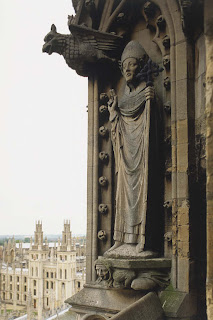 QUOTE
QUOTEWhat does Holy Scripture mean when it asserts that God “predestines”? The verb itself, proorizo, means “to arrange ahead of time.” In the biblical context, where this verb appears with “foreknow” (proginosko, “to know ahead of time”), the verb signifies the providential arrangements by which He brings people to the grace of the Gospel. That is to say, predestination embraces the mysterious influences that God brings to bear on history, so that all things work together for the good of those who love Him.
This is very clear in the story of Joseph in the Old Testament. God made use of the sins of Joseph’s brothers to predestine—to arrange for—the deliverance of Joseph’s family: “And God sent me before you to preserve a posterity for you in the earth, and to save your lives by a great deliverance. So now it was not you who sent me here, but God. . . . But as for you, you meant evil against me; but God meant it for good, in order to bring it about as it is this day, to save many people alive” (
“To predestine,” as understood in the Bible (where, in fact, the noun never appears) has no reference to any alleged divine decree whereby some people are consigned to heavenly life and others to everlasting damnation. On the contrary, God wills all men to be saved. Indeed, in the Bible, predestination does not refer to any divine decree at all. It is a description, rather, of God’s providential activity in history, working to bring good out of evil.
Nowhere, therefore, does Holy Scripture hint even faintly at a person’s “predestination to hell.” In fact, this repulsive idea does violence to the Bible, in which predestination is always a category of grace, never of punishment. Predestination pertains invariably to the divine call, not the rejection of that call. It is always a description of the divine favor, not disfavor. It certainly does not include God’s arrangements to have someone damned. (Daily Reflections, Fr. Patrick Reardon, 2-13-2009)
COMMENTARY
Many struggle with the concept of predestination. This is due to the fact that the voice that towers above all others regarding this subject in the Christian west is that of John Calvin and his theological offspring. Calvin pioneered a view that assembled a list of passages to tell the story of redemption with the decrees of God as the starting point for salvation. According to Calvin these decrees were made before the foundation of the world, wherein God created two people groups, the elect, and the reprobates. The elect were predestined by God unto eternal life, and the reprobates were predestined unto damnation. Hence, before the creation God had hell in mind for his creatures. This is an expansion of Augustine’s views, which were never taught or embraced as presented by Calvin prior to the reformation.
In the above quote we see quite another approach to the subject, we see a view which does not do damage to God’s character. In this view we are presented with a God who as the scriptures teach "desires all men to be saved." Moreover, we see that this predestination of God is what He does “to arrange events ahead of time” in order that what men who intend evil are actually thwarted and there actions actually turn out for good. Thus, the author points to the account of Joseph the patriarch to demonstrate his point.
What is undeniable is that the God of Calvin, and the God of the author is not the same God; one God is best known for creating justice for evil, & the other is best known for planning to create good out of evil. It is this second God that the church universally confessed when they spoke with one voice, the other is one man's innovation.


